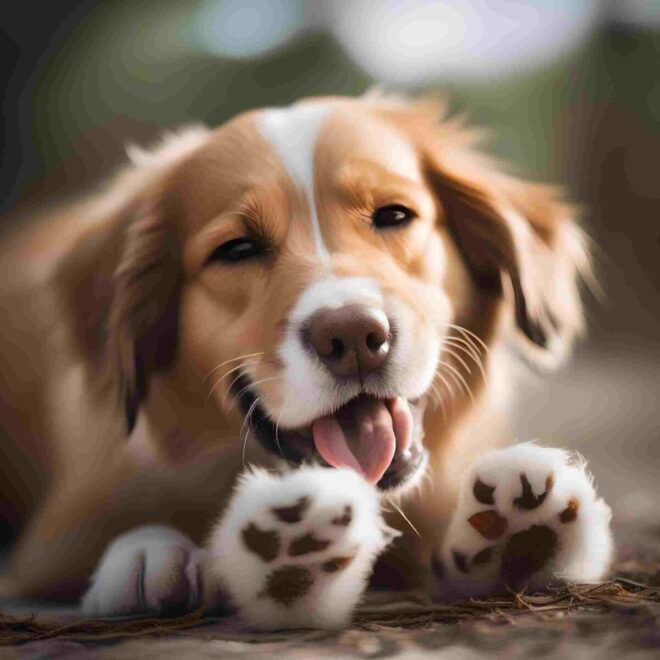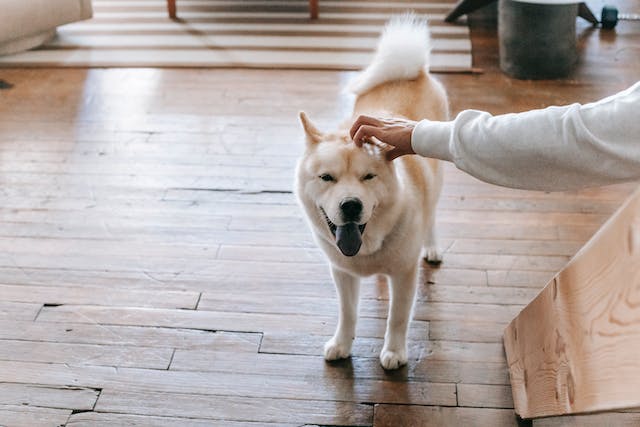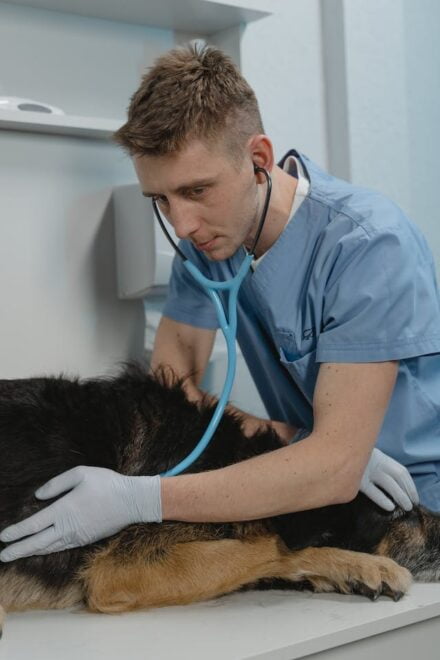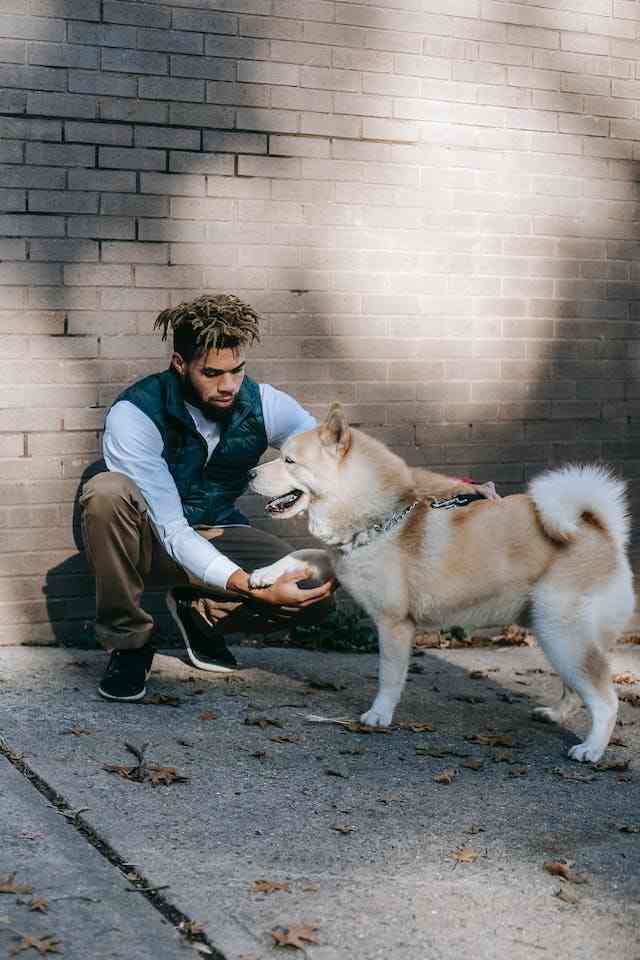
Dogs are amazing animals with a wide range of behaviors that both enthrall and occasionally baffle their human counterparts. Paw licking is one such action that frequently causes dog owners to squirm. When one sees a furry friend regularly giving their paws the attention they need, the question “Why do dogs lick their paws?” becomes unavoidably apparent.
. In this in-depth investigation, we will peel back the layers of this behavior, investigating the many motivations behind dogs’ paw licking habits and illuminating whether they may be a harmless habit or a symptom of a more serious problem.
Table of Contents
why dog licks paws?
Recognizing the Relationship Between Paws and Canines:
Dog paws are essential to their everyday actions and sensory experiences; they are more than simply useful appendages. They lick their paws for a variety of reasons, including communication, grooming habits, and instinct. We can unravel the many motivations underlying this widespread tendency by exploring the complex realm of canine behavior.
Instinctive Personal Care:

Dogs are innate groomers, and part of their normal cleaning ritual involves licking their paws. During the first few weeks of life, puppies pick up this behavior from their moms, who use their tongues to clean them and encourage bowel motions. Dogs that lick their paws keep themselves cleaner by getting rid of dirt, trash, and even parasites that could have gotten stuck during outside adventures.
Sensory Exploration:
Dogs understand their environment primarily through their sense of scent. Dogs may mark their territory by licking their paw pads, which have scent glands that allow them to spread their distinct smell to various surfaces. In this situation, paw licking is a means of communication between dogs; it tells other dogs about a dog’s identification, status, and recent actions.
Allergies and Itchy Sensations:
Itching discomfort is one of the most frequent causes of excessive paw licking. Dogs may itch for a variety of reasons, such as skin irritations, allergies, or insect bites. Dogs may develop allergic reactions in response to seasonal allergies, contact with particular plants, or reactions to particular foods; as a reflex, they may lick their paws to relieve the itching.
Medical Disorders and Aches:

Strong and continuous paw licking could be a sign of a hidden medical problem. Dogs that suffer from ailments like bacterial or fungal infections, cuts, bruises, or joint pain may lick their paws excessively in an effort to relieve the pain. It is imperative that pet owners monitor their pets for additional indicators of distress, such as limping, swelling, or behavioral changes, and seek veterinary advice for any possible health issues.
Weather-Related Factors and Dry Skin:
Like people, dogs may get dry skin, especially during inclement weather. The paw pads might get flaky and dry, which would be uncomfortable and lead to excessive licking. Dogs who suffer from dry skin may find that their need to lick their paws is lessened by using pet-friendly moisturizers, drinking enough water, and eating a balanced diet full of nutrients.
Anxiety and Stress:
Due to their high level of sensitivity, dogs may become stressed or anxious when their surroundings, routine, or social dynamics change. Dogs may use paw licking as a self-soothing technique to deal with these emotional difficulties. Paw licking due to anxiety can be controlled by locating and removing stressors, creating a safe and regular environment, and using positive reinforcement methods.
Diet and Gastric Distress:
Gastric distress has also been connected to paw licking. Dogs that are having digestive problems or upset stomachs can behave strangely, licking a lot. Preventing gastric distress-related paw licking requires keeping an eye out for food allergies, maintaining a well-balanced and nutritious diet, and making sure your pet has access to fresh water.
Behavior Seeking Attention:

Because they are social animals, dogs enjoy interacting with their human companions. Paw licking is a behavior used by certain dogs to attract attention, either positive or negative. Pet owners should be aware of how they react to their animals and work to encourage positive behaviors while discouraging excessive licking as a means of gaining attention.
Conclusion:
All things considered, paw licking is a complex behavior that is influenced by instinct, grooming habits, physiological conditions, and psychological states. Even though paw licking on occasion is usually harmless and has several benefits, watchful pet owners should be aware of behavioral changes that might indicate underlying problems.
Regular grooming, a healthy diet, taking care of environmental issues, and creating a loving, stress-free environment are all components of proactive dog care. It is essential to speak with a veterinarian if paw licking is bothersome or persistent in order to ensure a proper examination and diagnosis.
We can improve our relationship with our four-legged friends and give them the love and care they require for a happy and healthy life by learning the complex reasons behind why dogs lick their paws.
why dog licks paws?
Why do dogs lick their paws excessively?
Dogs may lick their paws excessively due to various reasons, including allergies, irritation, or pain. Excessive licking can be a sign of discomfort or an attempt to soothe themselves. If this behavior persists, it’s essential to consult with a veterinarian to identify and address the underlying issue.
Can boredom cause a dog to lick its paws?
Yes, boredom can contribute to excessive paw licking in dogs. Dogs may engage in this behavior as a way to self-soothe when they are not mentally stimulated or lack physical activity. Providing regular exercise, playtime, and mental stimulation can help reduce boredom-related licking.
Is paw licking in dogs related to allergies?
Yes, allergies are a common cause of paw licking in dogs. Environmental allergens, food allergies, or even contact allergies can lead to skin irritation and itching, prompting a dog to lick its paws. If allergies are suspected, consulting with a veterinarian can help determine the specific triggers and develop a treatment plan.
How can I tell if my dog’s paw licking is due to pain?
Persistent or sudden changes in paw licking behavior may indicate pain or discomfort. If your dog is favoring one paw, limping, or showing signs of distress while licking, it’s crucial to seek veterinary attention. Painful conditions such as injuries, infections, or joint problems could be the underlying cause.
Are there other reasons for dogs licking their paws?
Yes, there are various reasons for dogs licking their paws, including grooming, cleaning, or addressing minor irritations. Additionally, behavioral factors like stress or anxiety can lead to paw licking. Observing the context, frequency, and any accompanying symptoms can help determine the cause and guide appropriate intervention if necessary. If unsure, consulting with a veterinarian is recommended.

One Reply to “why dog licks paws?”